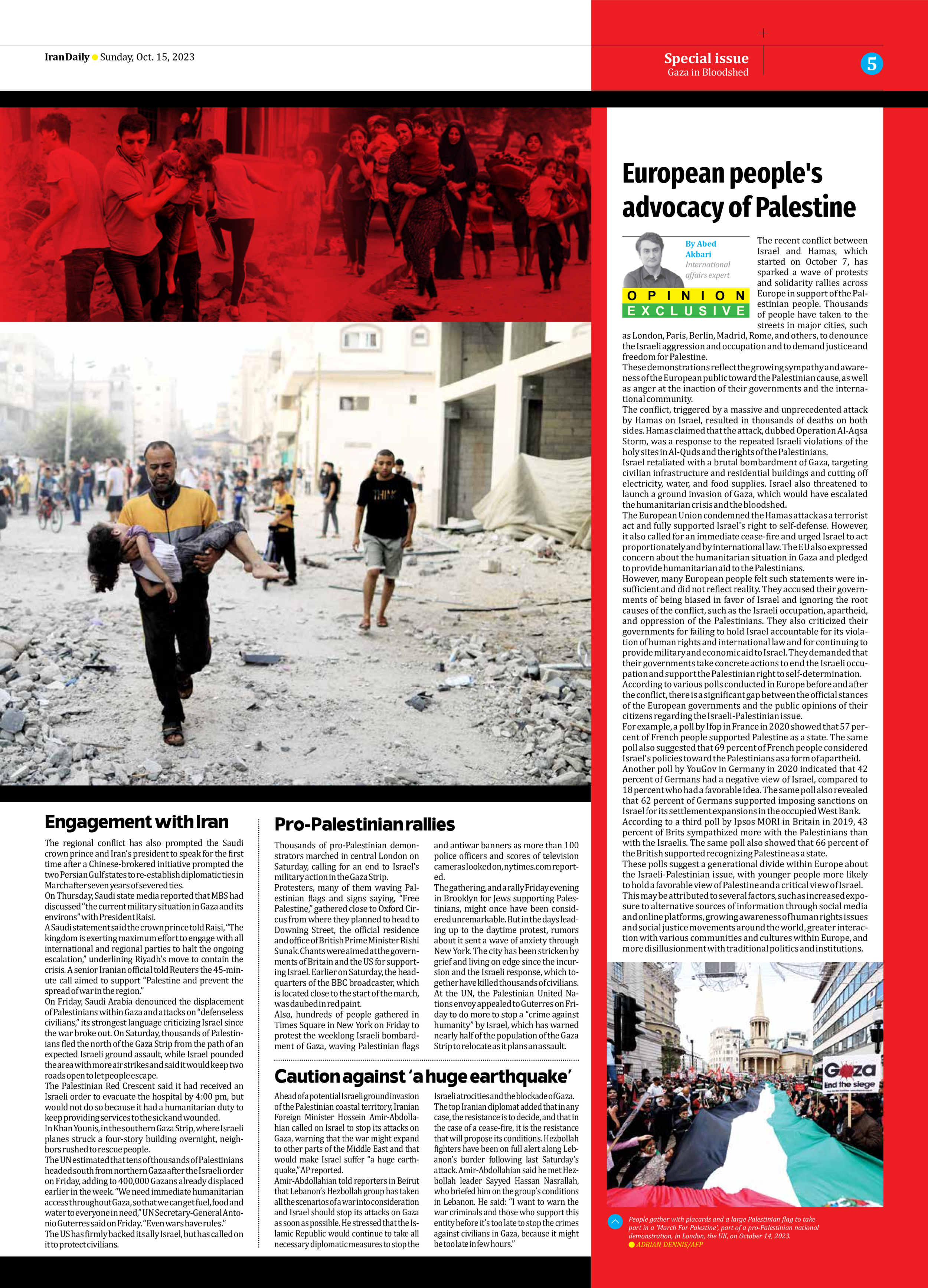
European people’s advocacy of Palestine
By Abed Akbari
International affairs expert
The recent conflict between Israel and Hamas, which started on October 7, has sparked a wave of protests and solidarity rallies across Europe in support of the Palestinian people. Thousands of people have taken to the streets in major cities, such as London, Paris, Berlin, Madrid, Rome, and others, to denounce the Israeli aggression and occupation and to demand justice and freedom for Palestine.
These demonstrations reflect the growing sympathy and awareness of the European public toward the Palestinian cause, as well as anger at the inaction of their governments and the international community.
The conflict, triggered by a massive and unprecedented attack by Hamas on Israel, resulted in thousands of deaths on both sides. Hamas claimed that the attack, dubbed Operation Al-Aqsa Storm, was a response to the repeated Israeli violations of the holy sites in Al-Quds and the rights of the Palestinians.
Israel retaliated with a brutal bombardment of Gaza, targeting civilian infrastructure and residential buildings and cutting off electricity, water, and food supplies. Israel also threatened to launch a ground invasion of Gaza, which would have escalated the humanitarian crisis and the bloodshed.
The European Union condemned the Hamas attack as a terrorist act and fully supported Israel's right to self-defense. However, it also called for an immediate cease-fire and urged Israel to act proportionately and by international law. The EU also expressed concern about the humanitarian situation in Gaza and pledged to provide humanitarian aid to the Palestinians.
However, many European people felt such statements were insufficient and did not reflect reality. They accused their governments of being biased in favor of Israel and ignoring the root causes of the conflict, such as the Israeli occupation, apartheid, and oppression of the Palestinians. They also criticized their governments for failing to hold Israel accountable for its violation of human rights and international law and for continuing to provide military and economic aid to Israel. They demanded that their governments take concrete actions to end the Israeli occupation and support the Palestinian right to self-determination.
According to various polls conducted in Europe before and after the conflict, there is a significant gap between the official stances of the European governments and the public opinions of their citizens regarding the Israeli-Palestinian issue.
For example, a poll by Ifop in France in 2020 showed that 57 percent of French people supported Palestine as a state. The same poll also suggested that 69 percent of French people considered Israel's policies toward the Palestinians as a form of apartheid.
Another poll by YouGov in Germany in 2020 indicated that 42 percent of Germans had a negative view of Israel, compared to 18 percent who had a favorable idea. The same poll also revealed that 62 percent of Germans supported imposing sanctions on Israel for its settlement expansions in the occupied West Bank.
According to a third poll by Ipsos MORI in Britain in 2019, 43 percent of Brits sympathized more with the Palestinians than with the Israelis. The same poll also showed that 66 percent of the British supported recognizing Palestine as a state.
These polls suggest a generational divide within Europe about the Israeli-Palestinian issue, with younger people more likely to hold a favorable view of Palestine and a critical view of Israel.
This may be attributed to several factors, such as increased exposure to alternative sources of information through social media and online platforms, growing awareness of human rights issues and social justice movements around the world, greater interaction with various communities and cultures within Europe, and more disillusionment with traditional politics and institutions.







